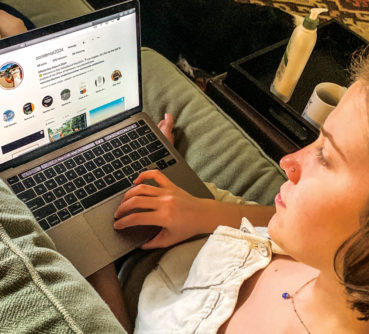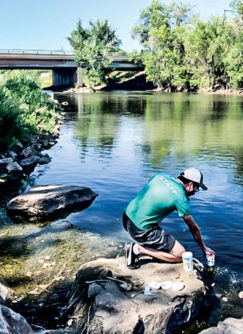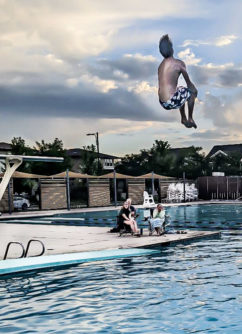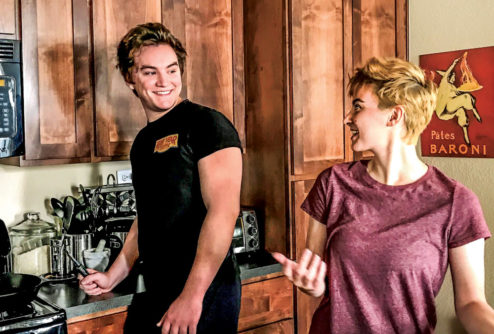

East High School graduate May Toll is meeting her new classmates at Occidental College in Los Angeles via Instagram. She’ll live at home and study remotely. Photo courtesy of May Toll
The COVID-19 pandemic has upended many normal routines and traditions, but perhaps nowhere more than the annual fall ritual of heading off for college. This year, students are facing a variety of ever-changing scenarios—from on-campus classes, to remote learning, to decisions about whether to defer for a year. For nearly everyone, the experience has been fraught with anxiety and the realization that their plans may continue to change for many months ahead.
That was true for recent East High School graduate May Toll. She was excited to get an email from Occidental College in mid-June informing her that in-person classes would resume and freshmen would move into the dorms. One month later—after the number of coronavirus cases surged in Los Angeles—she received an update: all classes would be held online and students could not live on campus.

Ivan Tochimani-Hernandez, shown working at his internship with the Greenway Foundation, will study on campus at Dartmouth and live in a single dorm room. Photo courtesy of Ivan Tochimani-Hernandez
“I was so disappointed and also felt a lot of anxiety about how I was going to succeed working online. I’m an in-person learner and I’m likely going to be a theater major. Doing theater online seems crazy.” She says she’s hiring an executive function coach to help her overcome some of the online learning disadvantages she has because of ADHD. “I want to figure out how to have more structure so I can create a way for me to succeed.”
Ivan Tochimani-Hernandez, who graduated from DSST Montview in May, is also feeling some anxiety even though his plans to move to Dartmouth College in September are still on track. The first-generation college student said he knows it won’t be a typical freshman experience. “We’re all going to be in single dorm rooms. We must wear masks at all times. Some of the classes will be online and they’ve cancelled all of the normal freshman social functions like a camping trip before classes start.”
He says he’s glad freshmen have been given priority–only 50% of students at Dartmouth are allowed to come to campus. “My parents are still a bit concerned about whether there are enough safety precautions. Since I’m the first in my family to go to college, there’s just a lot of uncertainty about everything,” says Tochimani-Hernandez.

Griffin Batt, who had planned to study political science and be on the diving team at American University, chose to take a gap year rather than study remotely. Photo courtesy of Griffin Batt
It was that uncertainty that led Griffin Batt to defer college for a year. He was planning to study political science and join the diving team at American University this fall. But he started getting nervous that classes would end up being offered online, so in July he decided to take a gap year. “Just after I made my decision, American announced it would go 100% online and that students wouldn’t be allowed to move on campus. That sounds so miserable. I’m so glad that I’m not doing that.”
Instead, Batt is applying for an internship with the Colorado Office of Economic Development and International Trade. “In granting a deferral, American University encourages students to do something international or political. Since international travel can’t happen, I figure this internship could be the next best thing.”
Central Park mom Courtney Drake-McDonough says she feels lucky that the pandemic hasn’t drastically changed the plans for her two college students, who will continue their studies at Metro State University. “My kids thought it was important to graduate college without having to take out big loans so they’ve lived at home and taken advantage of scholarships.” In addition to graduating virtually debt-free, she says the arrangement means she’s less worried about them being exposed to the coronavirus this fall. “Although if one of us gets exposed, it could be tough on all of us since we’re all under one roof.”

Ethan and Olivia McDonough chose to attend college in Denver and live at home. Photo by Courtney Drake-McDonough
Ethan and Olivia McDonough are still waiting to hear whether all of their classes will be online or whether it will be a mix of in-person and virtual. “My kids have always taken 1 or 2 classes online before, so it’s not a huge adjustment for them. But they have noticed that some teachers haven’t fully adapted to teaching online, which can make it difficult to stay engaged.”



0 Comments